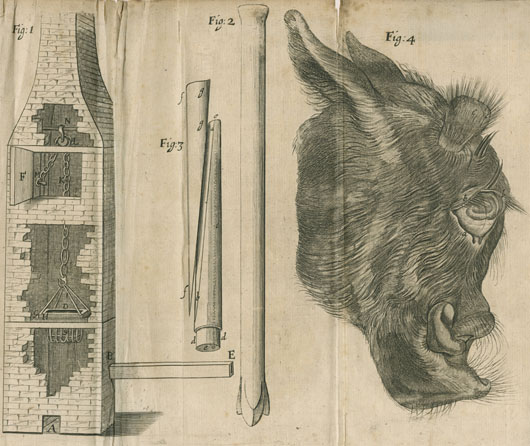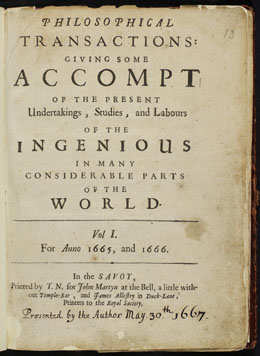Surviving science

A ‘monstrous one-eyed colt’. Copyright The Royal Society.
A new £1m project, led by the University of St Andrews, will tell the story of the world’s oldest surviving scientific journal.
University historians have been awarded the funding to study Philosophical Transactions, the most famous journal in the history of science.

Inside cover.
Launched in 1665, academics say the journal’s immense duration is ‘unique in the history of publishing’.
It is hoped that the study of the journal and related documents will deepen understanding of how much science and scientific publication has changed over the last 350 years.
The project, which will utilise the unrivalled resources of the Royal Society’s archives, will be led by Dr Aileen Fyfe of the University’s School of History.
Dr Fyfe, an international expert on the history of publishing the sciences, said, “Philosophical Transactions is the most famous scientific journal in the history of science, yet the details of the commercial, economic and editorial practices which lie behind the ground-breaking research published in its pages have barely been studied.
“Our project will build upon existing scholarship on the early years of the journal, in the late seventeenth century, but will pursue the story into the era of industrial printing, the professionalisation of science, and ultimately, electronic publishing. We are particularly interested in the gradual development, adaptation and decline of editorial practices, commercial strategies and technological processes.”
In its earliest days, Philosophical Transactions was a private venture of the Royal Society’s secretary. In the eighteenth century, it became an official Society publication, but by the nineteenth century, it faced new competition from commercial science journals and those launched by newer, more specialised, learned societies.
By the time the twentieth century came along, scholarly publishing became increasingly commercialised, and questions were asked about the ownership and reliability of research results.
Dr Fyfe continued, “There are a number of episodes where the Society and the Philosophical Transactions came under fire, and these will enable us to look critically at the contingent development of the processes and practices that are now taken to be essential to the operation of modern scientific research.”
The project will investigate issues throughout the history of the world-leading journal – such as the origins of peer review, and the relationship between profitability and the publication of scholarly knowledge.
The £986,500 project has been funded over four years by the AHRC (Arts & Humanities Research Council), with the support of the Royal Society.
Professor Jonathan Ashmore FRS, Chair of the Committee overseeing the Royal Society’s Centre for History of Science, said, ‘The Society is delighted to be working with St Andrews on this important project. Through close analysis of a most remarkable scientific journal, it will deepen our understanding of key aspects of the growth of science.
“It will also challenge us to think more perceptively about issues that confront us today. I am particularly pleased that the Society’s rich collection of archival material relating to Philosophical Transactions will be at the heart of the historical analysis.”
Philosophical Transactions, which is published by the Royal Society in London, will celebrate its 350th anniversary in 2015.
ENDS
Note to editors
Dr Fyfe is available for interview on 01334 462996 or email [email protected]
Note to picture editors:
Images of the historic journal are available from the Press Office – contacts below.
Issued by the Press Office
Contact Gayle Cook, Senior Communications Manager on 01334 467227, [email protected]
Ref: Surviving Science 150113
Follow St Andrews news on Twitter
Like us on Facebook
Category Research